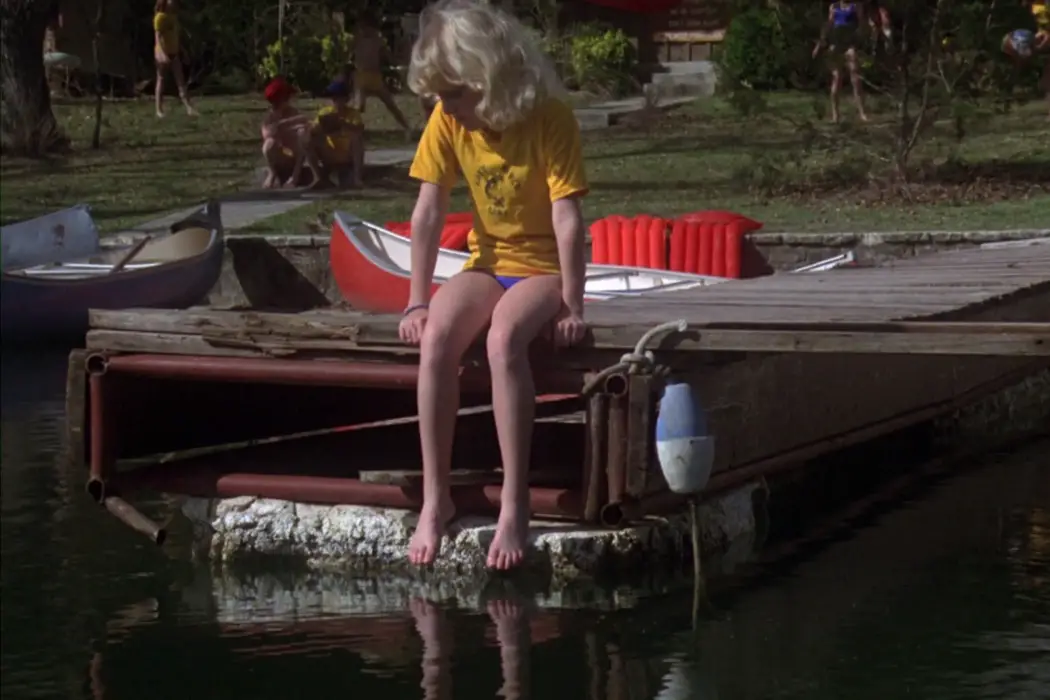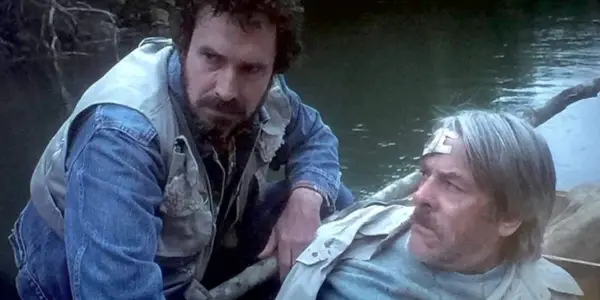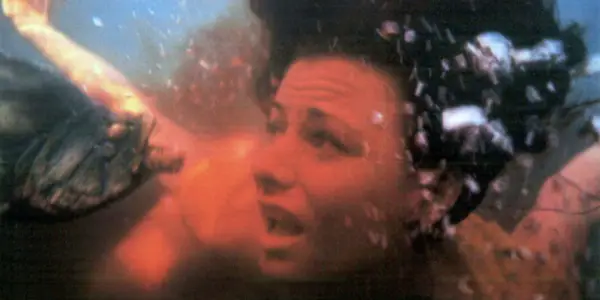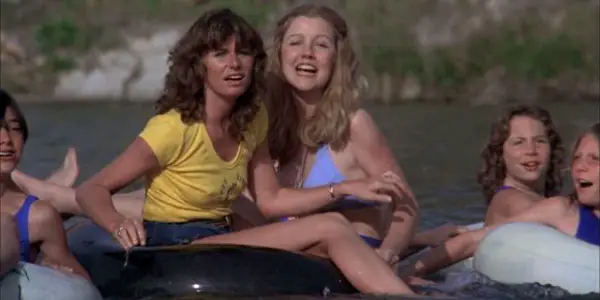Horrific Inquiry: PIRANHA (1978)

Stephanie Archer is 39 year old film fanatic living in…
Welcome back to the scariest, and at times goriest, column here at Film Inquiry: Horrific Inquiry. Twice a month, I will be tackling all things horror, bringing two films back into the spotlight to terrify and frighten once more. And occasionally looking at those that could have pushed the envelope further. Join us as we dive deep into the heart of horror, but warning, there will be spoilers.
”What about the Piranha?”
”They are eating the guests, sir”
Jaws, Cabin in the Woods, Friday the 13th and Sleepaway Camp are horror films that traditionally dominate the summer season. Yet, these are not the only films that have graced the screen, capturing the spirit of both summer and gore. Critically, Joe Dante‘s Piranha is a mediocre horror film at best. Yet, as an overall cinematic experience, it is a film that should not be so easily dismissed. Beyond its predictive narrative and unseen monster, Piranha boasts a climatic crescendo of gore, coupled with an unexpected examination of those in power. And while you may find yourself laughing at its ridiculous nature at times, Piranha proves to overall to be an entertaining venture.
Early Similarities
There is a classic horror feel to the opening of Piranha, with two hikers traveling through a mountain at night. As they decide to push forward for just a little bit longer before setting up camp, they come across a fence labeled “No Trespassing” – a sign they predictably ignore. As they enter the compound the fence encompasses, Barbara (Janie Squire) and David (Roger Richman) come across a containment pool seeing the relief in the cleansing and cooling waters it offers. As they dip their hand in, the camera shoots to an extreme close-up of an enlarged eye opening up dramatically, hinting at the danger that lurks beneath the surface. As they both race across the pool, David begins flinching uncontrollably, crying out as he bobs under the surface of the water – blood pooling outward from where he had just been. Barbara has attacked moments after, the camera turning to take in the moon, the screams from below confirming her fate. Though the camera does not entirely look away, rather turns to the pool ledge once more to see Barbara’s hand swing over, clinging to its edge one last time before slipping to the water below.

While predictable, the opening of Piranha is effective in establishing the premise for the film. We know there are piranha’s under the surface with the ability to consume an entire human – two at that. And while the title removes the question of “what” lies below the surface, the opening leaves the question of size and quantity. Yet, where the opening is effective for the upcoming nature of the film, there is a familiarity that does it an initial disservice.
Piranha, especially in its opening sequence, is to often reminiscent of its predecessor Jaws. A late night swim ends in the vicious attack from below the surface. No one around to witness the loss of life – to witness the attack – just personal belongings left behind to indicate they had been there. And while the bodies of David and Barbara do not reappear like in Jaws, there is the feeling we have seen this before. This lingering feeling is only more deeply rooted as we transition from the opening to our central character of Maggie (Heather Menzies-Urich), seen playing the Jaws arcade game.
Transitional Search
As we quickly learn, Maggie has been hired to discover the whereabouts of David and Barbara as they have not checked in recently from their hike. A “bloodhound”, as she describes herself, Maggie heads to the mountain where the campers were last known to be, enlisting the help of local recluse and drunk Paul Grogan (Bradford Dillman). As they discover the compound, they too enter to search for the campers, their search bringing them into the heart of the lab run by Dr. Robert Hoak (Kevin McCarthy). As they take in the genetically modified specimens around them, viewers take in the first inklings that the piranha in the tank may be worse than originally alluded to.

Determined to uncover the whereabouts of the hikers, and convinced their remains are at the bottom of the pool after discovering their gear, Maggie drains the containment tank, subsequently releasing the piranha into the wild. And while this dramatic turn of events is accompanied by dramatic displays of fighting, the film comes to a dead stop as Maggie and Paul are forced to wait out the night before taking a raft and Dr. Hoak down the river. Where the action is in the piranha themselves, Piranha makes a huge misstep early in the film, leaning more into exposition between Maggie and Paul than the action viewers were promised and came to see. As the trio make their way to the raft and down the river, the film has to reestablish the intensity and vibe, disconnecting many viewers along the way.
Thankfully, Piranha returns to the core of its film, giving backstory to the creation of the piranha and leaning into what does make this film succeed, albeit entertaining – the gore.
The Lore of Gore
As the trio make their way on the raft, racing to reach the dam before it releases water into the lakes and stream below, the piranha too are shown making their way as well. Jack (Keenan Wynn) and his dog Brandy are the first to interact with the piranha, Brandy warning his owner as the fish approach. Jack becomes the first victim of the town, a father fishing with his kid the next further down stream. Each attack that follows is more brutal and graphic than the last giving its audience exactly what they expect and came to see.

Piranha is built on the suspense of knowing the gore is coming. We know what is attacking the townsfolk and swimmers, but what we want to know is how gruesome it will really get. And Piranha delivers in its crescendo of gore, each attack more brutal and violent than the last. It is in these moments alone that the film is able to capture the intensity of the shot, one that speaks to the belief of success in subsequent remakes decades later. Individuals horrifically sinking to the depths below, engulfed within merging water and blood is truly elevated as a camp counselor succumbs to one of the film’s more gruesome moments. And while poorly crafted shots are shown of the piranha swimming across the screen to indicate their arrival, there is one scene in particular just before a moment of carnage where the swarm grows in the distance that truly stands out.
Scene and gore merge in the film’s final attack during the opening party for a resort built on the newly constructed lake. As bodies are pulled from the water, the chunks of flesh and limb missing speaks more to a war scene rather than an aquatic attack. This visual gives the film a representational continuity with the reason for the existence of the genetically modified fish. As Dr. Hoak explains to Paul and Maggie earlier on, he had been hired by the government to weaponize the piranha, making them not only able to survive a vast array of temperature and salt content but to be faster, smarter, and more aggressive. The idea was that the government, currently engaged in war with Korea, would release the piranha into the river systems as a means of modern warfare. As the fish are subsequently released on American rivers instead, the government’s attempt at playing god and genocide become their own undoing.
Playing God
Operation Razorteeth becomes not only the consequences of man’s desire to create and conquer but opens a conversation to the unknown powers of government – and to whom those consequences fall. Here, it is the citizens living on the river, attending the camp and visiting the newly opened resort. The decisions of governments have permeating and lasting effects that they not only fail to claim accountability for, but keep buried.

One of the most eye-opening aspects of Piranha is not just the gruesome fish and their victims, but rather the actions of the Army enlisted to maintain the situation. At first, the military convoy rolling towards the dam seems a strange choice, almost out of place for the vibe of the film. Yet, as the challenges they present begin to unfold, the idea of the government playing God takes on a whole new perspective. As Paul and Maggie attempt to convince Colonel Waxman (Bruce Gordon) and Dr. Mengers (Barbara Steele) that the piranha are in the water, and the implications of what would happen if they were to escape the dam, disbelief turns into full disclosure of the situation at hand. Not only did the military know the Dr. Hoak had continued his experiments on the piranha, but they also will do anything within their means to prevent the knowledge of them reaching the general public.
As Paul and Maggie are arrested and detained by police, the Trooper (Barry Brown) doing a “favor” for the Army by keeping them locked up, the horror transfers from the fish to the power of government and military. Seemingly powerless, Maggie and Paul escape the the police holding cell, arriving to late to the children’s camp but hopeful to save those further downstream. Unbeknownst to them, the military had already made arrangements in case they had escaped, the Colonel calling the head of the resort to alert them that someone may try to call warning them to dangers of the piranha. He is further advised on how to have his staff handle the news should it get beyond him. The news outlets are even contacted, the final attack by the fish happening just as they are warning the local newspapers of the possibility of a prank call.
All this while it is revealed that the Colonel is not only destructive in the secrecy that will cost the lives of many but corrupt in the investments he has secretly put into the resort itself. Looking back over the annals of American history, especially in recent years, this entire sequence of events hits hard.
Conclusion
While Piranha may not be the best horror film, even boarder lining ridiculous at times, it is undeniably entertaining. For a low-grade horror, it delivers an escalating level of violence and gore that at times even delivers some of its best visual constructs. As the film leaves a war zone in its wake, Piranha becomes a monster movie where viewers will be left questioning who the real monsters are.
Have you seen Piranha? What did you think? Let us know in the comments below!
Watch Piranha
Does content like this matter to you?
Become a Member and support film journalism. Unlock access to all of Film Inquiry`s great articles. Join a community of like-minded readers who are passionate about cinema - get access to our private members Network, give back to independent filmmakers, and more.












